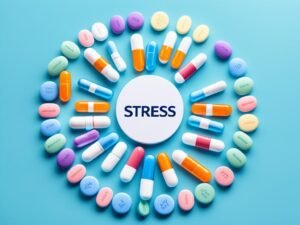Stress is a part of life. But too much can be bad for us. Many vitamins and natural things can help lower stress. This guide will show you the best vitamins and supplements. They help your body deal with stress better. And they can make you feel calmer inside. You’ll learn about things like ashwagandha, rhodiola, melatonin, and L-theanine. They are great for your self-care.
Key Takeaways
- Certain vitamins and natural supplements can help support the body’s natural stress response and promote relaxation.
- Adaptogens like ashwagandha and rhodiola can enhance resilience to mental and physical stress.
- Melatonin, a natural hormone, can regulate the circadian rhythm and improve sleep quality, which is crucial for stress management.
- Magnesium and B vitamins play important roles in modulating the stress response and supporting mood regulation.
- L-theanine, an amino acid, can aid in stress reduction, relaxation, and improved focus.
The Power of Vitamins in Managing Stress
Experts say not one supplement can cure stress. But, vitamins and natural elements can help with stress. Ashwagandha and rhodiola are adaptogens that work with your stress system. Melatonin is a hormone that helps you relax and lowers stress hormones.
Understanding the Body’s Stress Response
Magnesium and B vitamins are key for managing stress. They help make the mind chemicals that keep your mood steady. Lack of vitamin D can make you feel sad and stress out more.
The Role of Vitamins in Enhancing Resilience
Studies show vitamins and some supplements make you handle stress better. They can lift your mood and help you sleep. Things like ashwagandha, rhodiola, melatonin, and L-theanine support your health and mood.
Addressing Nutritional Deficiencies
It’s important to get enough vitamins, minerals, and adaptogens to fight stress. If you’re missing some nutrients, you might get more stressed. Fixing these shortages can help you face life’s ups and downs better.
Ashwagandha: Nature’s Adaptogen for Stress Relief
Ashwagandha is a special herb used in Ayurvedic medicine. It is known for helping the body deal with stress. Using ashwagandha for stress has been shown to lower stress and cortisol better than not taking it.
How Ashwagandha Interacts with the Stress Response System
Ashwagandha works with the HPA axis, which handles our body’s stress. This special interaction helps our body tackle stress, whether from daily life or more challenging times.
Scientific Evidence Supporting Ashwagandha’s Benefits
Studies have backed up ashwagandha’s benefits. They show it can lower stress and cortisol after taking it for a few weeks. It has also helped people sleep better, feel less stressed, and sharper mentally.
Recommended Dosage and Safety Considerations
The right amount of ashwagandha for stress is 300-600mg each day. It’s best to take it in small amounts throughout the day. This powerful herb is safe for most people, but talking to a doctor is smart, especially if you’re on other medicines or have health issues.
Rhodiola Rosea: The Herbal Ally for Stress Resilience
Rhodiola is a herb that boosts your body and mind. It helps control stress hormones and chemicals in your brain. Because of this, it’s really good for helping your body deal with stress better due to the rhodiola for stress benefits.
Understanding Adaptogens and Their Role in Stress Management
Adaptogens are special herbs that help your body handle all kinds of stress. They work to keep your stress systems in balance. Thanks to many studies, we know herbs like rhodiola are great for lowering physical and mental stress.
Exploring Rhodiola’s Mechanisms of Action
Rhodiola can control the body’s stress system, the HPA axis, and its main hormone, cortisol. Plus, it might change how brain chemicals work, adding to its calming and mood-lifting effects. Its antioxidants also fight damage from too much stress.
Optimal Dosing and Duration of Use
Experts say taking rhodiola is okay for 6 to 12 weeks at a time, but we still need more long-term safety info. A normal dose is 200-600mg a day. Yet, you should check what’s best for you with a doctor. Most people do well with rhodiola, finding it safe for stress relief.
Melatonin: Regulating Sleep for Improved Stress Management
Melatonin is a key in setting our sleep and wake times. It does more than that. It helps our bodies and minds stay calm. This is by making us relax and lowering stress-causing hormones like cortisol. So, using it can make sleep better and stress easier to handle.
It’s been found to work well in lessening anxiety before surgeries, almost like strong sleeping pills. Although, not much is known about how it directly affects stress. Still, improving your sleep with melatonin can be a step towards feeling less stress. For most people, short-term melatonin use is safe. But, it’s not clear if it’s okay for long periods.
The Sleep-Stress Connection
Sleep and stress affect each other in a big way. If stress lasts a long time, it can mess up your sleep. This then can make you stress even more because you’re tired. Melatonin helps by keeping sleep and stress in check.
Melatonin’s Impact on Sleep Quality and Anxiety
It’s good news on how melatonin can help. It makes sleep better and can lower stress before surgery. This shows promise in using it as a natural choice for stress-driven sleep troubles.
Dosage Guidelines and Safety Considerations
There are many melatonin types, from tiny pills to big ones, and even creams. For most adults, it’s safe to use the smaller kinds for a little while. But, we’re not sure about using it long-term. Also, it’s not good for some, like pregnant women, kids, or those with certain health issues.
Magnesium: The Calming Mineral for Stress Relief
Magnesium helps our body calm down and handle stress better. A lack of magnesium can make you feel more anxious, irritable, or have trouble sleeping. In 2017, a group of studies showed that taking magnesium supplements might help with mild anxiety, but we still need to learn more.
Magnesium’s Involvement in the Stress Response
Having too little magnesium can make stress worse, and stress can lower your magnesium levels. It’s smart for people under a lot of stress to check their magnesium levels. Enough magnesium can help your body deal with stress better.
Addressing Magnesium Deficiencies for Improved Well-being
Most Americans don’t get enough magnesium, which is a big issue. Food and farming techniques have made it hard to get all the magnesium we need. This means it’s harder for us to keep our magnesium levels up.
Bioavailable Forms and Dosage Recommendations
Magnesium glycinate is an easy-to-absorb kind that’s great for reducing stress. The National Institute of Health has some ideas on how much magnesium we should have each day. But, you should talk to a doctor before taking a lot of it. Too much can cause stomach problems.
| Magnesium Form | Advantages | Considerations |
|---|---|---|
| Magnesium Taurate | Increased brain magnesium levels more than any other form | May require higher dosages to achieve therapeutic effects |
| Magnesium Threonate | Can potentially enter the brain at high doses | Requires taking 2-3 times more capsules compared to other forms |
| Magnesium Glycinate | Highly bioavailable form, supported by research for anxiety | Dosage should be discussed with a healthcare provider |
| Magnesium Malate | Preliminarily effective in treating fibromyalgia and chronic fatigue | More research needed on its specific benefits for stress relief |
vitamin for stress: L-Theanine for Relaxation and Focus
L-theanine is a helpful amino acid from green tea for handling l-theanine for stress. It affects chemicals in our brain, like dopamine and serotonin. These can help make us feel good and stay calm and focused. A 2019 study showed that taking 200mg each day for 4 weeks helped lower anxiety, depression, and trouble sleeping. Another study review said that taking 200-400mg of l-theanine benefits daily can ease stress and worry.
Understanding L-Theanine’s Mechanisms of Action
L-theanine works by changing how certain chemicals in our brain work. For example, it boosts GABA, which helps us calm down. It also affects dopamine and serotonin, which help control our mood and feeling good.
Scientific Evidence Supporting L-Theanine’s Benefits
Studies show that l-theanine benefits stress and anxiety. One in 2012 found that people who took 100mg of it made fewer mistakes when concentrating. Another from 2018 said those with anxiety felt they slept better after taking 450-900mg daily for 8 weeks.
L-theanine might also help manage weight. It could make you less hungry and support your immune system. This might help prevent getting the flu or a cold too often.
Recommended Dosage and Potential Side Effects
For easing stress, a good amount of l-theanine dosage is usually 200-400mg a day. But, there aren’t strict rules on how much to take. It’s usually safe to use, and the FDA says it’s safe too.
Still, it can affect how some medicines work, like those for high blood pressure. It might also change how caffeine works. Before using natural stress relief supplements like L-theanine, talk to your doctor if you’re on medicines or have health issues.
B Vitamins: Essential Nutrients for Stress Resilience
B vitamins are key in handling stress. They help our body make chemicals like serotonin. These chemicals control how we feel and deal with stress.
The Role of B Vitamins in Neurotransmitter Synthesis
Lack of B vitamins can lead to more stress and feeling down. But, getting enough B vitamins can up how many of these helpful chemicals we make. This boosts how we deal with stress and feel mentally.
Addressing B Vitamin Deficiencies for Improved Mood
If stress is constant for you, check your B vitamin levels. A study from 2019 found a B vitamin boost for 4 weeks lifts mood and cuts stress. It’s a solid way to help your body cope better with stress.
Choosing the Right B Vitamin Supplement
Pick a top-notch B-complex supplement. It should have all the B vitamins for maximum benefit. Always stick to the dose instructions, as too much of some B vitamins might not help everyone.
Vitamin D: The Sunshine Vitamin for Stress Relief
Vitamin D is nicknamed the “sunshine vitamin”. It’s super important for good moods and managing stress. When we lack vitamin D, we can feel down and have trouble dealing with stress. Major depression and stress signs in Denmark show why this is such a big deal.
Vitamin D and Its Impact on Mood Regulation
Vitamin D is key in the brain. It works with some parts that affect how our mood chemicals, serotonin and dopamine, get made. So, getting enough vitamin D can help shake off blues and anxiety. It helps the brain work well and handle stress better.
Assessing and Addressing Vitamin D Deficiency
Many people lack enough vitamin D. This problem is thought to be huge in Europe. To make sure your body’s stress fighters are boosted, get your vitamin D levels checked. Then, if needed, your doctor can help you get the right amount. Doctors have found that not having enough vitamin D can make dealing with stress harder.
Optimal Dosage and Sources of Vitamin D
For most people, aiming for 600-800 IU of vitamin D daily is smart. This helps keep your mood and stress in check. Plus, hanging out in sunlight can make your body create vitamin D on its own. Doing things outside not only gives you more vitamin D, but it also lowers depression risk. So, it’s a win-win for stress relief.




